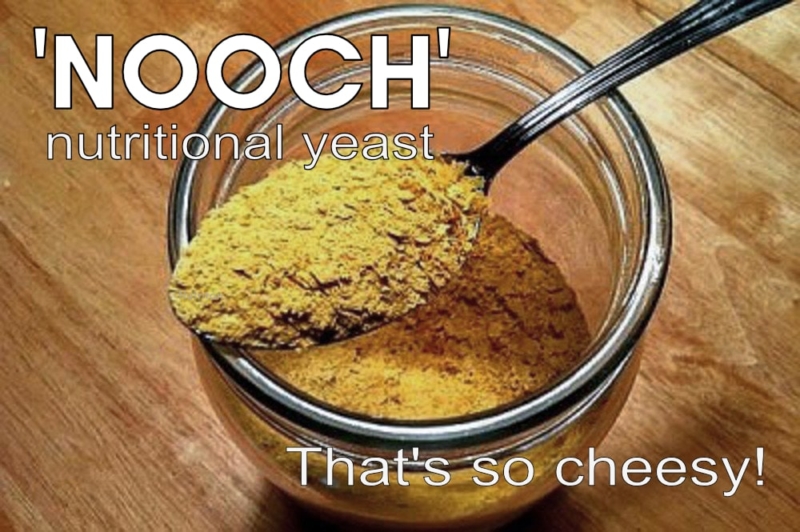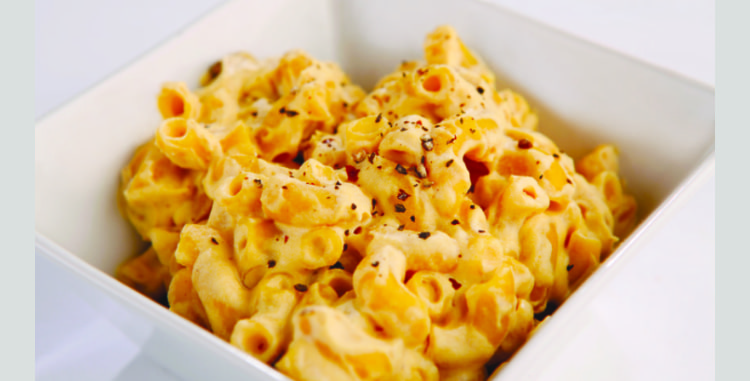'NOOCH' – The Plant-Based Superfood That Makes It Easy To Give Up Cheese

“There’s no way I can give up cheese!”
If I had a dollar for everytime I heard that one, I could buy a couple pounds of pule. Pule is the most expensive cheese in the world, fetching up to $1,000 per pound. And get this, it doesn’t come from sheep, cows or goats, it comes from … wait for it … donkeys!
But I digress. Point is, giving up cheese for many people is as difficult as going cold turkey for a 2-pack-a-day smoker.
If you can’t picture a life worth living without cheese, I’ve got some good news. Thanks to a flaky, yellowish powder that looks just like sprinkled, crumbly parmesan on pasta, you can experience cheesiness without the dairy. That’s good news for people like me who feel bloated and weighed down after eating anything with dairy.
I’m of course talking about nutritional yeast, the darling of the vegan culinary scene. I’m not 100% vegan, but I have been using nutritional yeast for several years now. (I can’t believe I haven’t blogged about it until now.)
In this post, I’ll discuss what nutritional yeast is and focus on its health benefits.

Why You Should Replace Regular Cheese With Nutritional Yeast
I don’t like being told what to do (ask my husband, Brandon) and I don’t like telling people what to do. So I’m not going to lecture about the evils of cheese and dairy and tell you that you should give up cheese. All I can say is that for many people, dairy tends to promote inflammation.
But wait! What about the French? How do they get away with eating all that cheese and not suffer from the same chronic diseases endemic in American society? Ah, that’s what they call the French Paradox.
While French eat plenty of cheese, they also eat a Mediterranean Diet and don’t snack all day like Americans. In traditional French society, people walk everyday and buy fresh, local, small-batch, artisanal foods. If you want to go ahead and eat some cheese here and there, fine. But if you’re not eating a Mediterranean Diet and living like the traditional French and other Mediterranean cultures do, then eating cheese is like pouring fuel on the inferno of metabolic disorders.
If you eat plenty of fresh, local, organic produce and avoid processed foods, go ahead and enjoy a portion of pule. But if you’re like the average American who has trouble with controlling portion sizes and leading a mostly sedentary life, reduce your cheese intake. Start replacing regular cheese with “NOOCH.”
What Is Nutritional Yeast?
Nooch (not to be confused with booch) is the most common yeast in food fermentation. Afraid of getting a yeast infection? Don’t freak out. You won’t get one by eating nooch. Nonetheless, it is a yeast. But it’s not the same as brewer’s yeast that makes beer bubbly (and bad for your gut). It’s also not the same yeast that makes bread and baked goods rise. (Nooch doesn’t rise and it’s not doughy.)
But the cheesy, nutty taste and mouthfeel will make your spirit soar because if you haven’t yet experienced it, you’ll be amazed by how much it tastes just like regular cheese. (I can’t say if it tastes specifically like donkey cheese because I’ve never tried pule.)
I want to reiterate that nutritional yeast won’t contribute to an overabundance of harmful yeast in your gut. Sprinkling some nooch on farro, couscous, or other grain, or making a velvety faux-cheese sauce isn’t a recipe for having to do a Candida cleanse. To be sure, nutritional yeast is the same species as brewer’s yeast. But it’s a radically different product. Brewer’s and baker’s yeasts are active yeasts; nooch is an inactive yeast.
Not only is nooch cheesy, it also has an umami profile. If you’re not sure what umami is, it’s one of the five food tastes. There’s sweet, salty, bitter, sour and savory. Umami describes a rich, savory flavor.

Health Benefits of Nutritional Yeast
I could regurgitate a bunch of nutrition facts like one tablespoon of nooch contains 17.6 micrograms of vitamin B-12. But you’ll probably forget these stats. What’s important to know is that nooch is one of the best sources of vitamin B-12 for vegans. B-12 is one of the hardest nutrients for the body to absorb. And if you don’t have good gut health, you’ll have a difficult time absorbing B-12, which is necessary for cellular energy.
But the good news is that, at least according to an exhaustive study in the journal Nutrients, nutritional yeast seems to be good for the gut. I’ll get into that in a sec.
Nooch also contains an impressive amount of protein, fiber, minerals and other B vitamins in just a small serving size. If you’re making, say, a big casserole, you’ll need more nutritional yeast, so you’ll get even more of the health benefits.
The Nutrients study says nooch increases the absorption of minerals and helps detoxify mycotoxins. Mycotoxins are pathogens that grow on mushrooms. Nooch also helps lower cholesterol levels in the blood, and acts as an antioxidant.
Nooch might be good for your gut because of its probiotic effects, says the study. It helps maintain the epithelial barrier integrity of the intestinal mucosa. What does that mean in plain English? It means like bone broth, it might be one of the best foods for preventing leaky gut.

Nutritional Yeast Probiotic
A while back, I wrote about traveling with kids. I revealed the best probiotic to take on your trip to prevent traveller’s diarrhea. It’s called saccharomyces boulardii. It’s actually not a bacteria like all other probiotics, rather it’s a yeast. S. boulardii is the only yeast that has been shown in research studies to benefit the good bacteria in your gut.
Why am I mentioning this? Because research has shown that S. boulardii is virtually identical to Saccharomyces cerevisiae, aka nutritional yeast.
So while regular cheese can make the belly’s of lactose-sensitive people squirm, nooch seems to actually offer protection against inflammatory gut reactions.
That’s the cherry on top for this cheesy topping that goes great on popcorn, sauces, soups, stews, and lots of other recipes.


